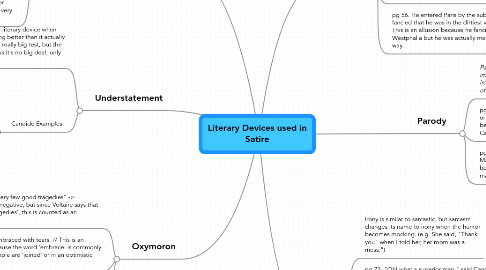
1. Hyperbole
1.1. Hyperbole is another literary device you use when you try to exaggerate an object or a phase. (e.g. I was so hungry that I could have eaten a horse.)
1.2. Candide Examples
1.2.1. pg. 48; They were delighted with possessing more treasure than all Asia, Europe, and Africa could scrape together./ This is considered as an hyperbole because it is exaggerating the amount of treasure the people were possessing.
1.2.1.1. Voltaire is trying to satirize people's greed and craving for money.
1.2.2. pg 74. "Oh, heavens! at Constantinople! But were she in China I would fly thither; let us be off." -> This is an hyperbole because Candide is saying that he can go anywhere in the world, for Cunegonde. Since he was in Europe, China was obviously very far.
1.2.2.1. Voltaire was satirizing how love can make everything come true.
2. Oxymoron
2.1. pg 59. "There are very few good tragedies" -> Tragedies are 98% negative, but since Voltaire says that there are 'good tragedies', this is counted as an oxymoron.
2.1.1. Voltaire is trying to say not everything is hopeless.
2.2. pg 49. They embraced with tears. // This is an oxymoron because the word 'embrace' is commonly used when people are 'joined' or in an optimistic way
2.2.1. Voltaire is trying to say that people can be joined together by all kinds of ways.
2.3. Oxymoron is a literary device you call when you use to opposite words/ phrases in the same sentence. (e.g. She made a happy tearing face when she was finished with the test.)
3. Understatement
3.1. Understatement is the literary device when you speak of something better than it actually is. (e.g. The test was a really big test, but the person in the story says it's no big deal, only one test grade.)
3.2. Candide Examples
3.2.1. pg 48. Yes, sir, it is the custom. They give us a pair of linen drawers for our whole garment twice a year. When we work at the sugar canes and the mill snatches hold of a finer, they cut off the hand; and when we attempt to run away, they cut off the leg.// This is an understatement because though this is a really horrible situation, this speaker says it without hesitating and say that it's just a custom.
3.2.1.1. Voltaire satirizes here of the cruelness and no rights during that era.
3.2.2. pg. 79, "Stop! stop! sir," cried Candide. "I will give you what money you please." -> This is also an understatement because Candide thinks he can do everything with money.
3.2.2.1. Voltaire is trying to satirize people's thoughts that money is everything.
4. Allusion
4.1. Allusion is another literary device when you write a statement without showing the real definition behind the sentence. (e.g. If I wanted to make an allusion of staying up late isn't good, I would write, 'I got such a bad grade on the test because I slept late last night.'
4.2. pg 51. This philosopher was an honest man; but he had been robbed by his wife, beaten by his son, and abandoned by his daughter who got a Portuguese to run away with her. // I count this as an allusion because though the sentence starts out with saying that this philosopher was an honest man, Voltaire tries to say his point of saying that though he was honest he wasn't very lucky.
4.2.1. Voltaire is satirizing violence and cruelness between people.
4.3. pg 56. He entered Paris by the suburb of St. Marceau, and fancied that he was in the dirtiest village of Westphalia. // This is an allusion because he fancied that he was in Westphalia but he was actually meaning Westphalia in a bad way.
4.3.1. Voltaire is satirizing how places can be changed to quickly just by a simple touch of people.
5. Irony
5.1. Irony is similar to sarcastic, but sarcasm changes its name to irony when the humor becomes mocking. (e.g. She said, "Thank you" when I told her, her room was a mess.")
5.2. pg 73. "Oh! what a superior man," said Candide below his breath. "What a great genius is this Pococurante! Nothing can please him." -> You can say that this is an ironical phrase because it Voltaire is mocking Pococurante.
5.2.1. Voltaire satirizes people talking behind others' backs.
5.3. pg 57. "Your tears are misplaced; that is a shocking actress; the actor who plays with her is yet worse; and the play is still worse than the actors." -> This dialogue is mocking tears which makes it an irony phrase.
5.3.1. Voltaire is pointing out the importance of entertainment during his era.
5.4. pg 58. "It means nothing, for they complain of everything with great fits of laughter; they even do the most detestable things while laughing." This dialogue mocks the way Parisians laugh at everything.
5.4.1. Voltaire is satirizing people's joy.
6. Parody
6.1. Parody is used when you want to imitate a story or an act ironically. (e.g. Eat It is a parody of Beat It.)
6.2. pg 54. "But do you believe," said Candide, "that the earth was originally a sea, as we find it asserted in that large book belonging to the captain?" -> This is a parody because Candide is disagreeing with that book.
6.2.1. Voltaire is satirizing people's beliefs through materials.
6.3. pg 56-57. The priest swore that they would not bury Candide. Martin swore that he would bury the priest if he continued to be troublesome. -> This is also a parody because Martin is making a parody out of what the priest had said.
6.3.1. Voltaire is satirizing friendship.
